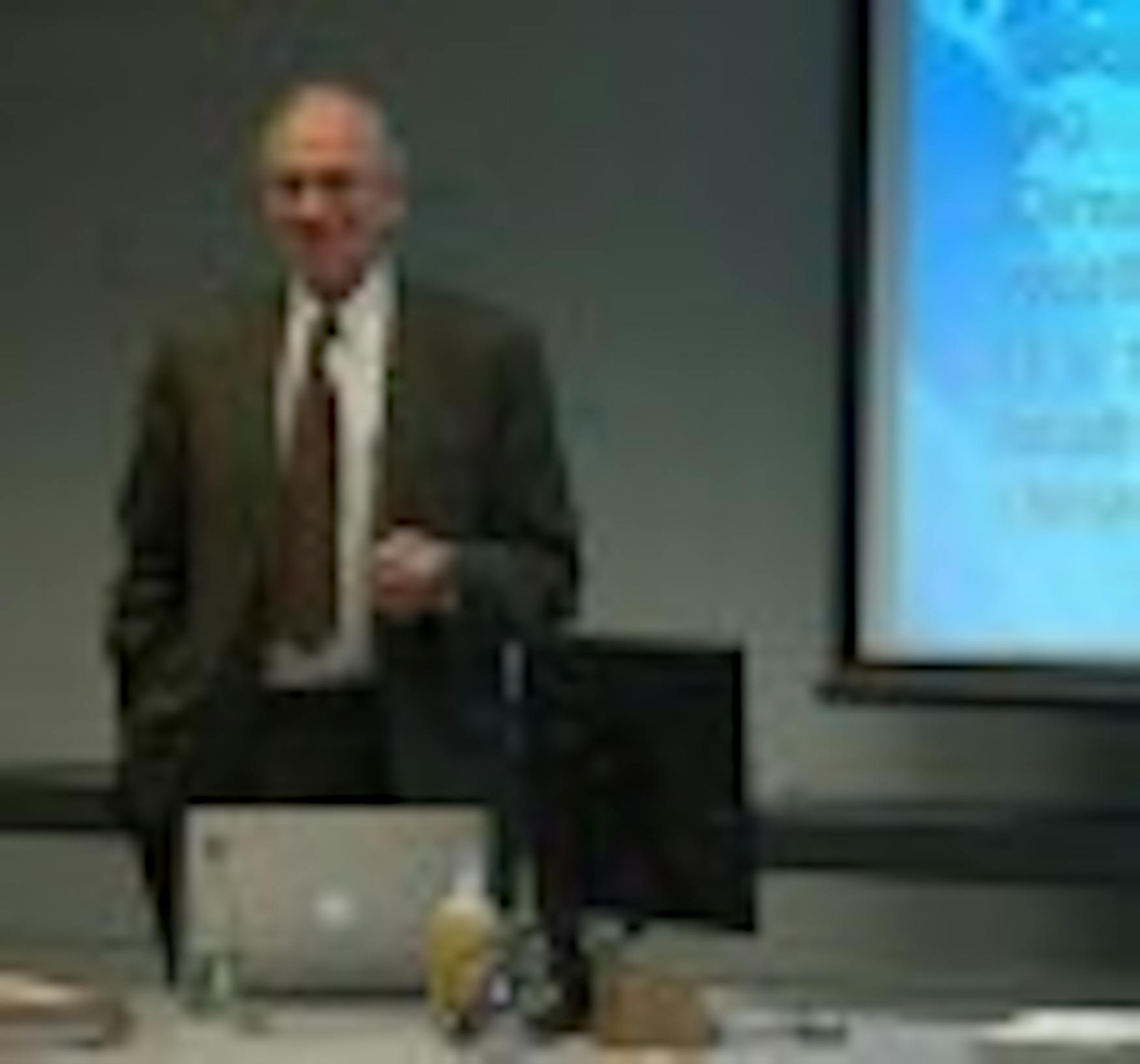Nobel prize winner discusses global warming effects, solutions
Nobel prize winner and Intergovernmental Panel on Climate Change Chapter Leader Professor William Moomaw discussed climate change, policy options and humans' effects on the atmosphere last Tuesday at the International Business School's Lemberg Academic Center, where he was featured as a guest lecturer.Moomaw, of the International Environmental Policy at the Fletcher School of Law and Diplomacy at Tufts University, was invited to speak by Prof. John Ballantine (IBS) during his course, "Investing in Energy." "[He] brings a down-to-earth approach to the science, extensive political experience as an IPCC climate scientist and a passion about the practical everyday things we can do to reduce our carbon footprints," Ballantine wrote in an e-mail to the Justice.
Moomaw has been working closely with the United States government in regards to climate change due to his involvement in the IPCC for over a decade. In 2007, IPCC was awarded the Nobel Peace Prize, shared with Al Gore, for its "efforts to build up and disseminate greater knowledge about man-made climate change," according to the Nobel Prize's website.
The IPCC was created in the 1980s during the former U.S. President Ronald Reagan's administration when scientists began pushing the reality of climate change, Moomaw said. The prevailing thought shifted from considering climate change as a "theoretical possibility" to actually "see[ing] signs that it may be happening." Global warming, too, became a serious issue: "There are all these positive feedback loops that, as it gets warmer, more things will happen to make it warmer still."
All scientists working on the IPCC are government appointed, Prof. Moomaw said. "Every 5 or 6 years, governments are asked to nominate scientists from their country to serve on the [panel]." He also listed the home countries of many of his colleagues, including Japan and Kenya. He attributed the multiculturalism of the team to the IPCC's desire to have a wide range of scientific backgrounds. This is further exemplified by the team leadership, as the chairs of each chapter consist of "one [person] from a developed [country] and one from a developing [country]" which, in Moomaw's case, are he and his Zambian colleague.
Moomaw said that climate change and global warming are a reality and cited 2010 as a year of prime examples. Not only did the first 11 months of 2010 set record temperature highs, which led to crop devastation in Moscow, he said, but the year was characterized by heavy rainfall in Pakistan, China and India as well. Moomaw noted that finally this international issue is being acknowledged, referring to Pakistan's foreign minister Shah Mehmood Qureshi's statement that "climate change is here and it's hurting us." This was particularly important because it was the "first time a major political leader" publicly recognized the matter.
"With the future, ... oil prices going up, [which] immediately reflects what's going on with clean air energy and climate change, [this is an important issue]," said Avidor Varuch, a graudate student attending IBS, in an interview with the Justice. As a member of the Investment Club, specifically covering its energy sector, Varuch said that "[attending the lecture] and learning about what's going on in the world ... has given [him] more infomation on [his] future investments in the industry."
Devender Sandhu, also a graduate student attending IBS, said in an interview with the Justice that Moomaw's lecture was valuable to attain a "clear picture [about climate change] from a person who has written reports and who has actually studied [the subject] so much."
Moomaw's presentation included "before and after" pictures on a slide show depicting environmental changes-such as now-grassy, former snow-capped mountaintops-over the past 40 years, which he defines as the amount of time standard for determining climate. "The rate of sea level rise has doubled since 1993 ... due to melting glaciers of ice gaps ... and thermal warming expansion," he said. "[We] may not want to believe in global warming," he said, "but [these changes are] not due to global cooling."
We can conclude, he continued, that "most of the observed increases in global average temperature ... is very likely due to the increase in anthropogenic greenhouse gas concentrations," a determination carefully phrased by the IPCC. He added that this does not mean humans are not to blame.
Turning to the greenhouse effect, Moomaw said that humans contribute to its negative effects. He said that "not all sunlight is absorbed by the earth-some is reflected and radiates heat back into space." About "240 watts per square meter get bounced back into space," Moomaw said, "and humans have added 1.6 watts [into] the atmosphere. ... [While this] doesn't seem like a lot, ... just that little bit of extra heat [is enough to cause a change]."
Humans also contribute to additional carbon dioxide in the atmosphere, Moomaw said. While carbon dioxide is present in the atmosphere, oceans and plants, humans are "putting extra [carbon dioxide] into the atmosphere faster than we, or oceans or trees can take it out."
He supported widespread theories about helping the atmosphere, noting that "while [carbon dio-xide] concentrations continue to increase, planting trees would help climate change." He also suggested that we focus on what we can do as individuals to reduce our own carbon footprints, which can be as simple as "driving less."
Moomaw concluded that we should not turn a blind eye to climate change, and Ballantine echoed his sentiments, writing in his e-mail that understanding the details of climate change is "particularly critical to the ongoing climate debate in this country and the rest of the world." Moomaw agreed: "[It is] not something about the future; ... it's not something theoretical. ... It's here.



Please note All comments are eligible for publication in The Justice.